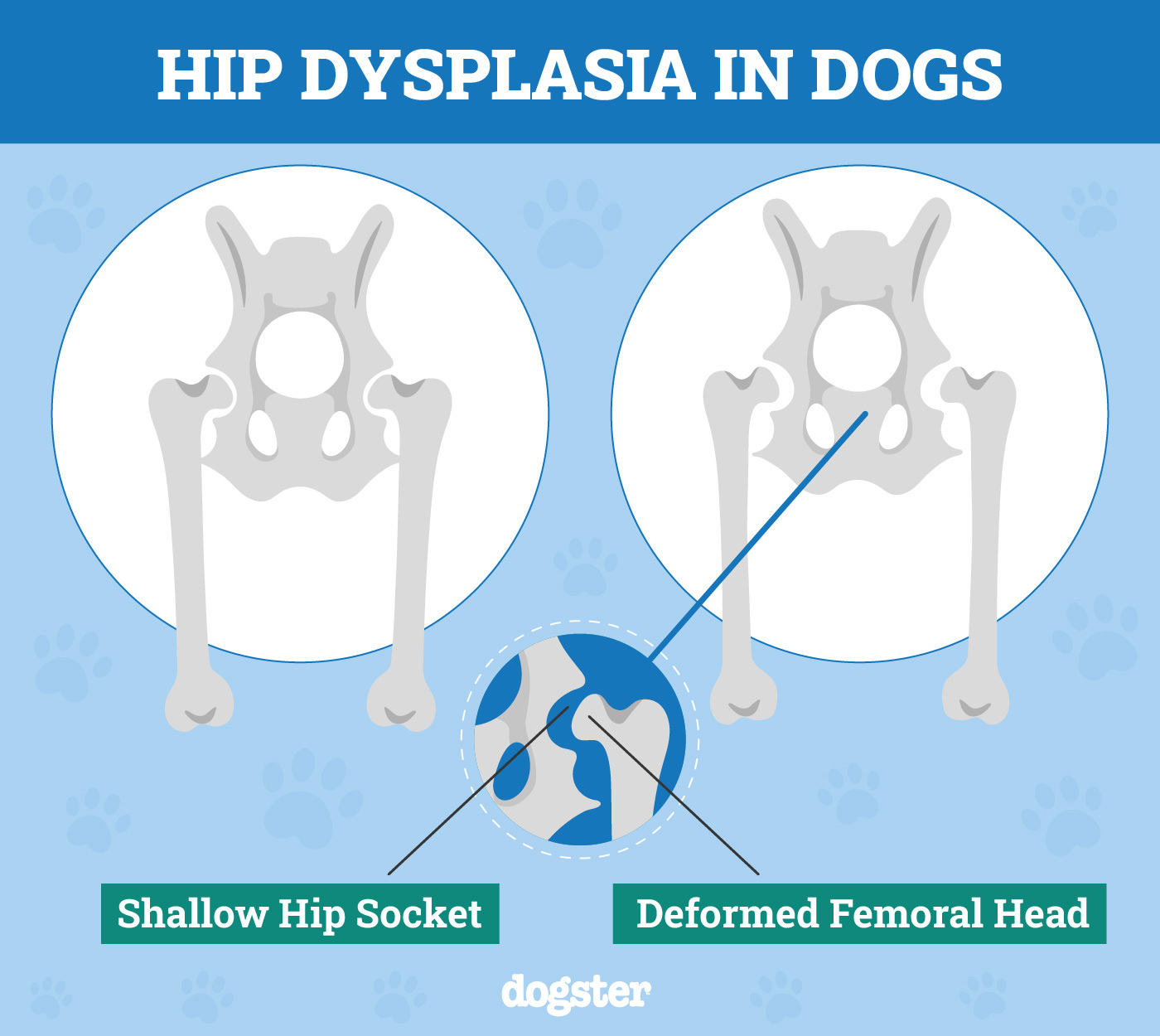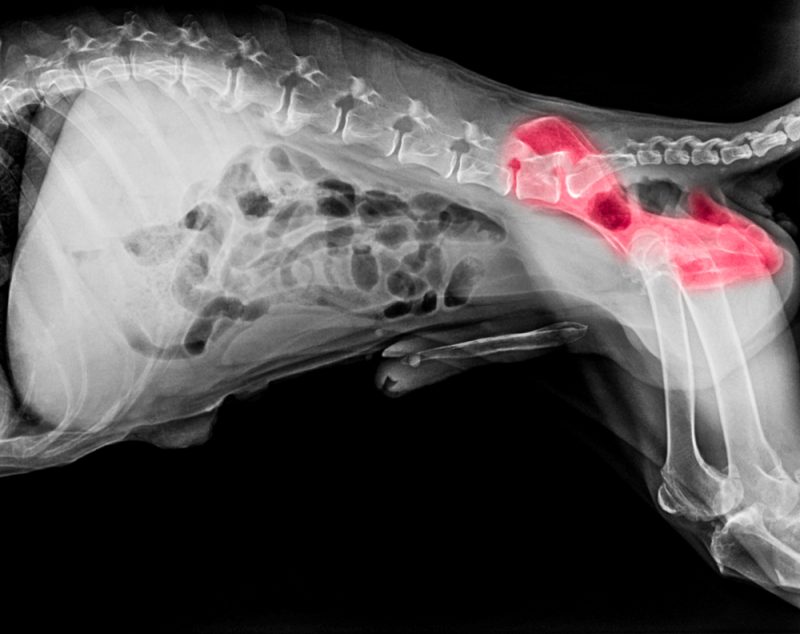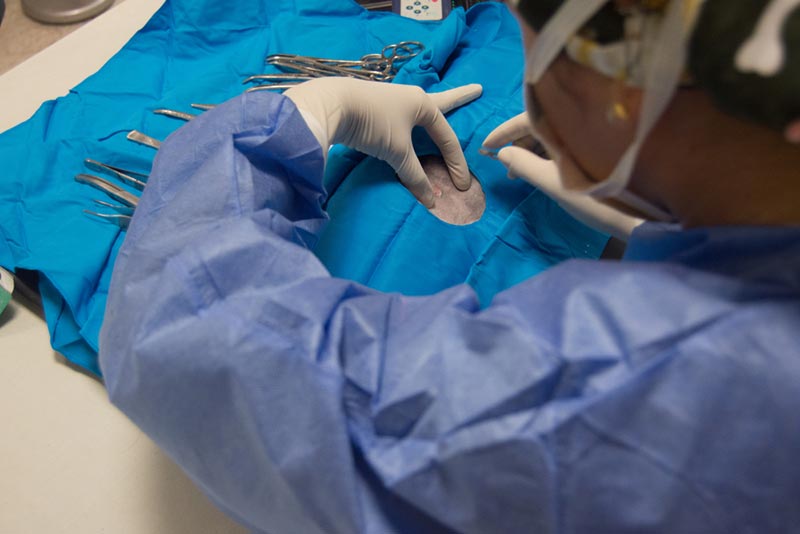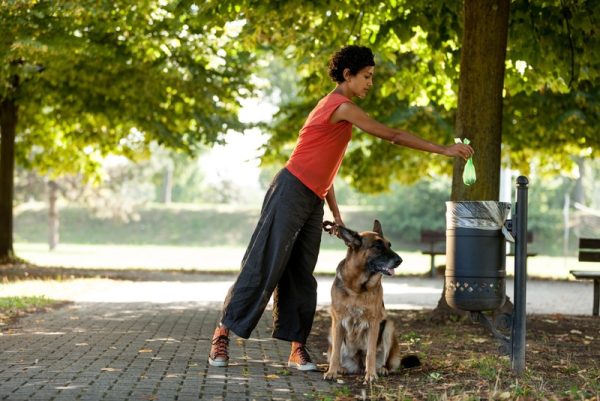Border Collies are bred to be active! Their intelligence, athleticism, and herding instincts make them incredible working dogs, but they can also be great family pets (as long as you can match their energy!). They might not be the first breed that comes to mind when you think of hip dysplasia, but unfortunately, they can be affected by this condition.
If you are planning to welcome a Border Collie into your home, keep reading to learn more about hip dysplasia: how it is identified, treated, and if there is anything you can do to reduce your pup’s risk.

What is Hip Dysplasia?

Hip dysplasia refers to a hip joint that did not develop properly. Hips are “ball and socket” joints. The “ball” is the top part of the femur (called the femoral head), and the “socket” is the part of the pelvis (called the acetabulum) that cradles the femoral head.
In normal hips, the head of the femur fits snugly into the acetabulum, allowing it to rotate smoothly. Dysplastic hips, on the other hand, are “loose” because of a poor fit between the ball and socket. When dogs with hip dysplasia move, their femoral head bangs around inside the acetabulum, injuring the cartilage. Over time this leads to arthritis formation, pain, and decreased mobility.
It is important to note that no two cases of hip dysplasia are the same! Some dogs are only mildly affected, others are severely debilitated by their condition, and many pups fall somewhere between these two extremes.
It is also worth mentioning that the level of dysplasia noted on hip radiographs (x-rays) does not always correlate with a dog’s degree of lameness (limping). Some dogs with significant changes on their X-rays are barely lame; others with mild changes on their X-rays can be quite sore.
When diagnosing and managing hip dysplasia, it is essential to treat each dog individually and look at their whole clinical picture (i.e., their hip x-rays and how they feel in their day-to-day life).
What Are the Signs of Hip Dysplasia in Border Collies?

Hip dysplasia can have a wide range of signs in dogs, depending on how severely their hips are affected. Here are some things to watch for:
- Having trouble getting up from sitting or lying down
- Not wanting to walk up stairs
- Showing less interest in exercise/play
- Decreased muscle in the affected hind leg(s)
- Lameness (limping) – occasional or all the time
- Hopping both hind legs together when running (“bunny hopping”)
If you notice these signs, please book an appointment with your veterinarian. Remember that dogs often hide their pain well, so it is not always obvious when they are hurting. When in doubt, get them checked out!
If you need to speak with a vet but can't get to one, head over to PangoVet. It's our online service where you can talk to a vet online and get the advice you need for your dog — all at an affordable price!

What Causes Hip Dysplasia in Border Collies?
There is not one straightforward cause of hip dysplasia in Border Collies (or dogs in general, for that matter). Rather, it develops as a result of multiple factors:
Genetics
We know that hip dysplasia is an inherited condition. Veterinary scientists have not yet determined the exact genetic changes contributing to the development of hip dysplasia, but it is a topic of current research. Maybe one day, we will have a genetic test that can be used to screen breeding dogs, but for now, hip radiographs (x-rays) are our best bet.

Exercise
There is no one-size-fits-all recommendation for exercising growing puppies, but a good general guideline is to let them dictate their own activity as much as possible. Try not to have specific goals for the length of your walks together. Rather, allow your pup to set the pace and take breaks (or stop!) when they get tired.
It is probably a good idea to avoid running or biking with your Border Collie until they are fully grown because they will likely feel motivated to keep up with you and could end up over-exerting themselves.
Nutrition
It is important to feed puppies a diet that has been specifically formulated for growth and development. Your veterinarian can recommend an appropriate diet for your Border Collie puppy and help you determine how much to feed them (the amount will change as they grow).
In general, growing puppies should be fed two or three measured meals per day rather than having free access to their food all the time.
Age At Spay or Neuter
Many veterinarians in North America have historically recommended spaying and neutering puppies around 6 months of age. However, some of the latest research has found potential health benefits (including a reduced risk of developing hip dysplasia for some breeds) of waiting until they are one year or older.
Your veterinarian can help you determine the optimal time to spay or neuter your Border Collie puppy.


How Do I Care For My Border Collie With Hip Dysplasia?
If your Border Collie has been diagnosed with hip dysplasia, treatment goals are to keep them as comfortable as possible, maintain their mobility, and generally provide them with a good quality of life.
Your veterinarian is the best source of advice for your specific pup, but here is a brief overview of the treatments currently available:
Surgery
Some dogs with hip dysplasia are good candidates for surgery, and several different procedures are available. The right procedure for a particular patient depends on their age and how much arthritis is present in the affected hip(s) at the time of diagnosis.
Finances are also an important factor to consider because some surgeries need to be performed by a veterinary orthopedic surgeon and are very expensive! You can find detailed information about the different surgical techniques in the treatment section of the hip dysplasia article published by the American College of Veterinary Surgeons (ACVS).

Weight Management
Helping your dog maintain a lean body weight can result in less pain and better mobility.
Your vet will design an individualized feeding plan for safe and effective weight loss if needed. It is not always as simple as just reducing the amount of food! It is critical to ensure that your pup continues to receive complete and balanced nutrition in order to preserve their muscle mass during weight loss.
Pain Management
Fortunately, there are a wide variety of medications available for pain management in dogs. Non-steroidal anti-inflammatory drugs (NSAIDs) continue to be one of the mainstays of treatment, but newer options like injectable monoclonal antibody therapy (e.g., Librela®) are very promising!
Physical Rehabilitation
Just like humans, dogs benefit greatly from physical rehabilitation. It is beneficial during post-operative recovery and throughout life to help maintain muscle and mobility. It is vital to seek out a licensed canine specialist, however! Your veterinarian should be able to recommend a professional in your area.
Nutraceuticals and Alternative Therapies
Nutritional supplements and alternative therapies have not been studied as extensively as more traditional treatment options, but they can be very helpful for some dogs.
- Omega-3 fatty acids, glucosamine, chondroitin, and other dietary supplements
- Polysulfated glycosaminoglycan injections
- Stem cell therapy
- Therapeutic laser treatments
- Acupuncture
Always talk to your veterinarian before starting your pup on supplements or seeking new treatment options.

Frequently Asked Questions
Is hip dysplasia common in Border Collies?
Hip dysplasia is not as common in Border Collies as in other breeds like Bulldogs and German Shepherds. According to the Orthopedic Foundation for Animals (OFA), which runs a well-known screening program for hip and elbow dysplasia in dogs, 10% of all Border Collie hip X-rays submitted to their program have shown evidence of dysplasia.
It is important to note that OFA screening is voluntary and that most X-rays are submitted by conscientious breeders working hard to reduce the number of dogs affected by hip dysplasia. Therefore, this number likely underestimates the true number of Border Collies affected by this condition.

How long can a Border Collie live with hip dysplasia?
Having hip dysplasia does not directly limit a pup’s lifespan. However, if we cannot keep them comfortable and mobile, it will affect how long they can have a good quality of life.
Can you prevent a Border Collie from getting hip dysplasia?
Since hip dysplasia is known to have a large genetic component, one of the best ways to prevent hip dysplasia is for breeders to continue screening for the condition. Lifestyle factors also play a role in the development of hip dysplasia, so here are some other things you can do to help reduce your pup’s risk:
- Talk to your veterinarian about your puppy’s diet to ensure you are providing them with proper nutrition during growth
- Never force a puppy to exercise; let them determine their own level of activity and always allow them to stop walking/running/playing when they get tired
- Ask your veterinarian if you should wait to neuter your male puppy until he is over one year of age

Conclusion
If you are planning on welcoming an adorable little Border Collie puppy into your life, you have just taken a significant first step by educating yourself about hip dysplasia!
Be sure to do your research and choose a breeder who screens their dogs for the condition. While this cannot guarantee that your puppy will not be affected, it is currently our best tool. Follow your veterinarian’s recommendations when it comes to feeding, exercise, and the timing of spay/neuter surgery for your puppy. Most of all, enjoy the new addition to your family!
Featured Image Credit: anetapics, Shutterstock


















